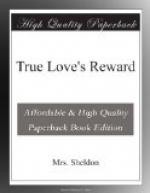“MY DEAR MONA:—You who have been the darling of my heart, the pride of my life; you have just left me, to go to your caller, after having probed my heart to its very core. I can never make you know the bitterness of spirit that I experience, as I write these lines, for the questions you have just asked me have completely unmanned me—have made a veritable coward of me when I should have boldly told you the truth, let the consequence be what it would; whether it would have touched your heart with pity and fresh love for a sorrowing and repentant man, or driven you away from me in hate and scorn such as I experience for myself. You have just told me that I have made your life a very happy one; that you love me dearly. Oh, my darling, you will never know, until I am gone, how I hug these sweet words to my soul, and exult over them with secret joy, and you will never know, either, until then, how I long and hunger to hear you call me just once by the sacred name ‘father,’
“Yes, Mona, I am your father; you are my child, and yet I had not the courage to tell you so, with all the rest of the sad story, this morning, for fear I should see all the love die out of your face, and you would turn coldly from me as you learned the great wrong I once did your mother.
“I told you that your father is dead. So he is, to you, and has been for many long years; for when I brought you from England, when you were only two years old, I vowed that you should never know that I was the man who, by my cowardice and neglect, ruined your mother’s life; so I adopted you as my niece, and you have always believed yourself to be the child of my only and idolized sister. But, to begin at the beginning, I first met Mona Forester one day while attending my aunt to a millinery store, where she had her bonnets and caps made. She waited upon her, and I sat and watched the beautiful girl, entranced by her loveliness and winning manner. She was a cultured lady, in spite of the fact that she was obliged to earn her living in so humble a way.
“Her parents had both died two years previously, leaving her homeless and destitute, after having been reared in the lap of luxury. I saw her often after that, we soon learned to love each other, and it was not long before she was my promised wife.
“But my first sin was in not giving her my full name. I was afraid she might be shy of me, if she knew that I was the heir of the wealthy Miss Dinsmore, and so I told her my name was Richmond Montague. About that time, my studies being completed, my aunt wanted me to go abroad for a couple of years.
“She also wished me to marry the child of an intimate friend, and take her with me. She had been planning this marriage for years and had threatened, if I disappointed her, to leave all her money to some one else.




